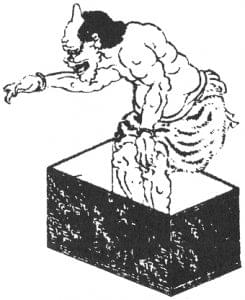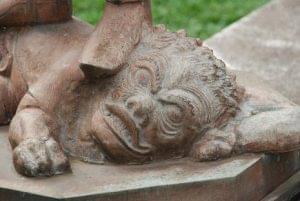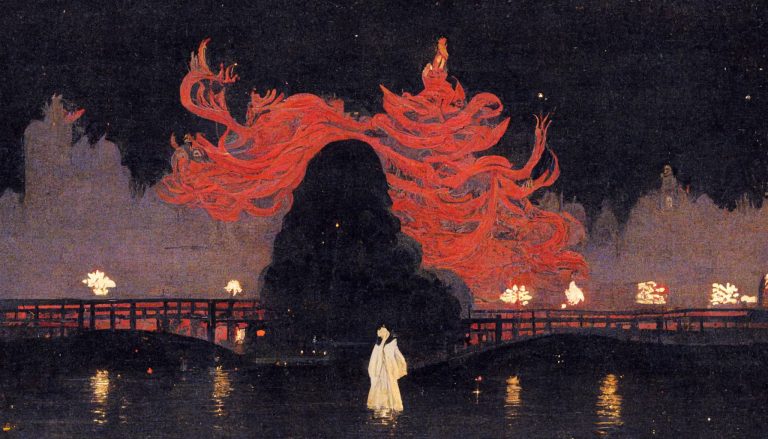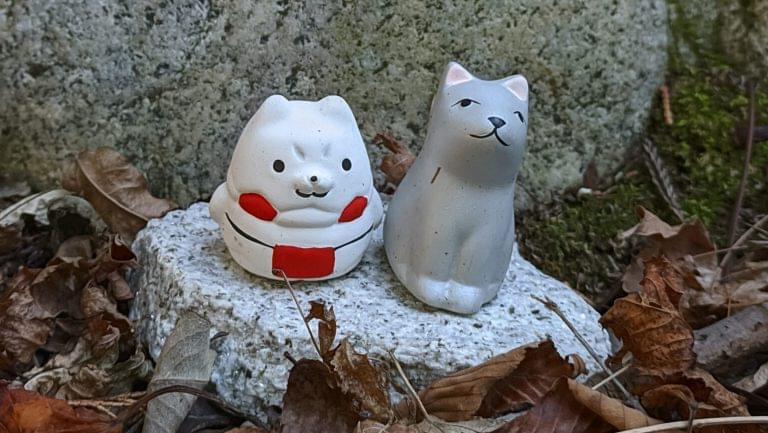This month’s podcast is a special one. Not only did I do a podcast about a strange little creature called the amanojaku (天邪鬼), but at the end I attached one of my Bedtime Stories that I record monthly for my Patrons. So if you stay tuned after the podcast (a whopping 10 minutes), you’ll be treated to my interpretation (the happy-ending version) of Urikohime (瓜子姫), The Melon Princess and the Amanojaku.
The podcast: The amanojaku is a nasty Japanese beastie that predates Buddhism, might have originated from a Shinto deity, who you can usually find getting trampled on by the Four Heavenly Kings at temples all around Japan.

Amanojaku is also a word used to describe a contrary person.

I want to give super special thanks to my Tech Guy for working so hard on getting the sound so good. I’m not an attention-to-detail kind of person. But he is and works his butt off, not to mention he has mad skills. Thank you, Rich Pav!
Episode Intro
Hey hey, this is Terrie and you’re listening to the June episode of Uncanny Japan.
June, where I live in Shizuoka, means it’s the rainy season, a dreary few weeks where you have to carry an umbrella with you at all times, and everything molds.
In a related note, I was just reading something about how back in old old Japan, before hair dryers, women had to be careful to dry their hair properly lest it mildew and smell terrible, not to mention the scalp problems.
I’ve given you a break from the frogs, and I am back at the ocean.
The Amanojaku
Okay, on to this month’s topic. Today I’m going to tell you about the Amanojaku. He’s a minor Japanese beastie with mysterious origins, who happens to be the antagonist in a folktale called Urikohime. His name itself is also a word that’s used to describe a very unpleasant person, and I’ll get to that in a second.
What is an Amanojaku?
But first, the name, Amanojaku. There are three characters. Ama (天) is heaven or heavenly, ja (邪) is wicked, injustice or wrong, and ku (鬼) is a different pronunciation of ki, which is the kanji or the character for oni, demon, devil, ogre.
So, heavenly, demon is an interesting and not incorrect translation. When you look up the term Amanojaku in English, you usually get three definitions.
One, a perverse person, a contrarian.
Two, a demon under the feet of temple guardian statues.
And three, an antagonistic demon in Japanese folklore.
Let’s take these in order.
So, number one, a perverse person or a contrarian. This is the way the word is used in casual spoken speech, but I have problems with the English definition because it doesn’t go into the nuances of the term, and it feels a bit off.
When I think of a perverse person, I think of a pervert, and we’re getting into like hentai area there, and a pervert is not what an Amanojaku is. A contrarian is closer, but that’s a word I don’t think I’ve ever used in my life. “Oh, you’re such a contrarian.” You’re being contrary, maybe?
So, basically, calling someone an Amanojaku means that the person is being deliberately contrary or contradictory. I hear it used a lot by adults when they’re talking to or about children. So, say a child does something just purposely to rile you up. An example being, “I told Touma to clean his room, but instead he just went and made a bigger mess. He’s such an Amanojaku.”
Or, say you’re talking to somebody and you’re like, “Oh, the sky is such a beautiful blue.” The Amanojaku would say, “No, actually, that’s not blue. That’s more of a gray.” You get the picture, and Amanojaku is a person who contradicts what you say or does the opposite of what you want them to do on purpose.
The second definition is fascinating and new to me. You have to first know that there are four heavenly kings in the Buddhist pantheon. They’re called Shitenno (四天王), and yes, a podcast needs to be done about those guys, so maybe next month. But for now, just take it for a fact that there are four heavenly kings whose statues you can find in temples all over Japan.
You can identify a Shitenno because they look angry, they have their swords and their spears raised, they’re wearing heavy armor, and in some instances, they have brightly colored faces, red, blue, white, and black. But the best way that you can tell this is a Shitenno, one of the four heavenly kings, is that if you look under its feet, and a good deal of the time, these big burly kings will be stomping or standing on some small wretched creature. That creature being crushed beneath the giant foot is an Amanojaku. So if you visit a temple in Japan, be sure to look under the feet of the statues and see if you can find an Amanojaku being squashed.
Two other places to look for them are under the eaves of temple buildings, and under the four corners of the water-filled basin that is used to purify yourself before you enter a temple. So basically, any scary-looking creature that’s being crushed is more than likely an Amanojaku.
Amanojaku are said to be wicked little creatures that can see into your heart, but not only that, they can make you act on your most evil desires, which is probably why the term is used to refer to a person who’s kind of being contradictory or contrary, almost out of spite.
The Mysterious Origins of the Amanojaku
Some, of course, say that the Amanojaku hail from China, as so many myths and traditions and folklore do, but other sources say that they are rooted in a wicked Shinto deity called the Amanosagume (天探女), and the Amanojaku is just thought to be a version of that, kind of an extension. It’s thought to predate Buddhism even, and this fascinates me because if the Amanojaku originated with Shintoism, and Shinto shrines are still around today, then why is it found in Buddhist temples and not Shinto shrines?
Another interesting offshoot and progression in the story of the Amanojaku is that it is sometimes represented as two small demons called Tentoki (天燈鬼), which is Celestial Lamp Demon, or Ryutoki (龍燈鬼), which is Dragon Lamp Demon, and the myth goes that they started out as evil Amanojakus again, and they have gone through time being stomped on by the four kings again and again and again, so that eventually they repented, saw the error of their ways, and became good guys, and now they carry lanterns and they offer light to light up the path of the Buddha in front of the Buddha so he can teach and spread his word.
So these two, this type of Amanojaku, you can also find in temples and statues, but instead of being crushed under boots, they’re actually these fierce creatures. They’re quite big, and there’s two of them, and they have these lamps, these giant lamps. One has the lamp on his shoulder, and the other has the lamp balancing on his head, so it’s kind of fun to look for those two.
Definition number three, the Amanojaku makes an appearance in Japanese folklore in a tale called Urikohime (瓜子姫), or the Melon Princess. This is a tale that has been told all up and down Japan, and there are so many different variations and actually different titles. It feels kind of like a riff on Momotaro, the Peach Boy, but instead of the Peach Boy, Urikohime, the Melon Princess, is a little girl. The story’s a bit different, and again, depending on where it’s told in Japan, it’s different.
So what I want to do today is I want to end with something special. I do what I call a bedtime story every month for my patrons, and these are usually obscure Japanese folk tales that I translate, I reimagine, and if need be, tweak them, and then I record them. Since there are so many different versions of this story, the Melon Princess, I’ve decided to retell and record two different versions this month.
The PG version I’m going to read to you right now, or I’m going to attach it to the end of the podcast, and then I’ll also put it up on my Patreon page for anyone who wants to come and read that at any time that they wish. The R version, which is quite a bit more bleak, to say the least, but a bit truer to the original, I’ll send that out to my patrons this month.
So I want to thank you all for listening about these pitiful and awful creatures called the Aminojaku, and if you keep listening for another maybe 15 minutes, I will tell you a bedtime story about the Aminojaku and the Melon Princess.
A Bedtime Story: Urikohime, The Melon Princess and the Heavenly Demon
Good evening, this is Thersa Matsuura from Uncanny Japan, and I’m going to tell you a bedtime story. But first, let me explain.
A bedtime story is something I do for my $5 and up patrons. Once a month I research and translate an obscure Japanese fairy tale. Then, I reimagine or tweak the tale as necessary, and finally record it with cool background music. It’s me, in your headphones, once a month reading to you an old Japanese folk tale before you fall asleep. The stories I choose range from dark, weird, funny, surreal, to downright creepy. You never know what you’re going to get.
So here we go.
Tonight’s bedtime story is called The Melon Princess and the Heavenly Demon. It’s a tale found throughout Japan. But while there are dozens if not hundreds of versions of it here, I don’t think it’s very well known outside the country. The one that I translated and reimagined and am going to read now on my Patreon page will be the PG version. A darker, more messed up story, more closer to the original, will go out to my patrons this month.
So I hope you are all tucked comfy into bed, because tonight I’m going to tell you about The Melon Princess and the Heavenly Demon.
Mukashi mukashi, in long ago Japan, there lived an old man and an old woman. Their life was simple and for the most part good. But they were missing something. One single thing that from the time they were married fifty years prior bore a shadow that grew darker and heavier with the passage of time.
A child. They had always wanted a child. Someone to adore and dote on, to watch grow and to love unconditionally. The time had long passed to have one of their own, so most nights were spent sitting on the dirt floor of their small thatched home, a crackling fire between them, lamenting their fate.
That went on for years until as luck, good or bad, one cannot judge, would have it. The couple’s sadness and regret became too much and the shadow that tormented them grew too heavy. No one is sure what happened exactly, but it somehow caused their minds to change in a peculiar way.
One day they woke up and heard birdsong outside their window and were convinced it was the sound of children laughing and playing. It was then they began to collect birds in earnest. The old man left early every morning to tramp through the hills and capture the creatures, while his wife sat at home weaving beautifully intricate cages to place them in. Sparrow hawks, skylarks, swallows, and the exceptionally noisy and foul-tempered bullheaded shrike. All variety of bird filled their home. Every wall was lined with bamboo-ripped cages, stacked from ceiling to floor. They hung from the rafters and eaves that surrounded the house. There were so many that the extras had to be shoved into the cellar along with the clay pots full of pickled plums and vinegared cabbage.
The old man and the old woman cared for the birds dearly, and as much as they could they loved them and doted on them, and pretended that they were their own children. It didn’t quite feel right though. In moments when they were more lucid, somewhere in their skewed thoughts, they both knew not one of these chatty animals was a real child.
One morning, after a particularly lucid realization, the old man reluctantly hauled his nets into the forest as was his habit, while his wife took a break from her cage weaving and carried their terribly threadbare clothing down to the river to wash. She knelt by the shore and began scrubbing the worn out laundry, careful not to tear any more holes.
Zabu-zabu-zabu-zabu she washed. After some time she heard a noise.
Zen-buku-kam-buku-zen-buku-kam-buku.
And looked up. There, rolling down the river toward her, was a large melon, perfectly intact.
Zen-buku-kam-buku.
She waded out and snatched the fruit from the water. “Hora, what a fine melon! I’ll take it home.” The old woman, in her excitement, left the laundry and her scrubbing stone and as quickly as she could tottered back to her home with the melon in her arms.
When her husband returned, after depositing three pigeons and a raggedy looking crow into the cages, he remarked, “What a fine melon! Let’s crack it open and eat it.”
The old man reached for the butcher’s knife that he always kept stuck in a fat, roughly sanded chunk of wood that he sometimes used as a table. He was just about to bring it down on the fruit when it burst open by itself and a baby slid out.
“Ho-ho-ge-ya, ho-ho-ge-ya,” the baby cried.
“Ma!” The old woman nearly fainted in delight. She clapped her hands together and exclaimed, “A baby girl! The gods have blessed us with a baby girl!”
The old man hugged his wife tightly, wiped a tear from his eye and said, “Let’s call her the melon princess.”
The old woman agreed. That was a wonderful name. The couple raised the girl. They adored her, doted on her, and loved her unconditionally. The shadow retreated.
Soon, though, they noticed something odd about their dear, sweet melon princess. That is, she grew at a disconcerting rate, each month of her life equaling a year in real time. After twelve months, for all intents and purposes, she looked and acted like a twelve-year-old child. But the old couple were grateful for her presence and still a bit soft in the heads and dared not question why.
Something else interesting happened on that first birthday. Up until then, the girl’s only interest was taking care of the hundreds and hundreds of birds. She called them her brothers and sisters. And there were so many now that in order to keep them, the old man had to build a new room and dig a deeper cellar. The melon princess continued to tend to her feathered siblings.
But the day after her birthday, she cobbled together a loom and began weaving, gathering the fallen feathers and down from the chittering birds during the day. She spent her nights at the loom, weaving the softest and most beautiful of fabrics. The colors were those of the birds, rich chestnut and smoky gray, golden yellow and pigeon-neck green.
Tok-king-ga-kari-king-ga-tari Tok-king-ga-kari-king-ga-tari was the sound of her loom, over and over, the shuttle sliding across the threads, the reed tamping the newest strand into place.
The girl continued like this for another year, tending the birds, weaving the fabric and making her parents very happy indeed. The weight of the shadow had entirely vanished and the old couple now spent their nights huddled near the fire, listening to the soothing sound tok-king-ga-kari-king-ga-tari and extolling their wonderful luck. Life was better than it had ever been.
On the melon princess’s second birthday, she was twenty-four years old and a beautiful young woman whom many neighboring townsmen had heard rumors about. The old couple were now feeling their ages and began to worry what might come of their precious daughter when they passed on to the Buddhist paradise.
“It’s unfair of us to keep her here,” the old woman said one evening to her husband. “I want what’s best for our daughter. Perhaps her happiness lies outside these walls, out from under this roof. But the melon princess knows nothing of the outside world. She doesn’t know what horrors lie in the forests, in the caves, in wicked men’s hearts. She is a bit naive. Will she be okay?”
It was true, the melon princess had only been alive on this earth for two years and the old couple had protected her so carefully that she had very little experience with the outside world. But maybe they could find the perfect man for her, someone who would protect her and love her just as dearly as they did.
It didn’t take long, but after many suitors came to visit and were tested and examined in various ways, they all decided on the fellow who would become her husband. He was a fine man, strong and brave, with rice fields and money. He had a calm nature and a good heart. Even his mother-in-law seemed like a decent person. Surely this man would give their melon princess a secure and a happy life. It was decided.
But first, the old couple needed to go into town with the entirety of their small savings and purchase the items for the melon princess’ dowry. The trip would be long and they would have to spend the night in town. This was the first time they would leave the young girl alone after dark. They were anxious and afraid. But the old man explained the situation and his bird-tending, feather-weaving daughter seemed to understand.
On the day they left, the old man said, “Melon Princess, after we shut this door, do not open it for anyone. There are awful creatures who lurk in the forest near here, and they would wish you harm. There is one in particular who dwells near here called the Amanojaku. He cannot enter if you do not allow him to. Keep shut, the doors and the windows. There is no need to go out. We will return tomorrow with your dowry and open the door ourselves.”
With that, they kissed their daughter on the forehead, slid shut the paper door, and set off on the journey.
Tok-king-ga-kari-king-ga-tari
The Melon Princess was content to work her loom and weave her cloth. The soothing sound of cheeps and chirps, scratching on hay, and the lofty, cloud sound of flapping wings all around her.
Time flew quickly as it did, and soon it was dark. She covered the cages with her pretty cloths and sat back down to work.
Ton ton ton. Someone was knocking at the door.
Ton ton ton.
“Melon Princess, Melon Princess, please open the door so we can play.”
“Dame,” the girl said. “I’m not allowed to let anyone in. No one is home.”
Ton ton ton.
“Melon Princess, Melon Princess, just open the door a little.”
“Dame,” she said again. “There are things in the forest that might wish me harm.”
Ton ton ton.
“Melon Princess, Melon Princess, I only want to play. Why don’t you open the door just a crack? The width of a fingernail would do.”
The Melon Princess thought about this. The girl got up from her loom and did as she was asked. She opened the door the tiniest of bits. But as soon as she did, a single, long claw slid through the gap and flung the door open so hard that it shattered against the wall. A foul, horrible-looking creature, an Amanojaku, leapt into the room.
The Melon Princess collapsed to the floor. She had never seen anything so awful. The monster stood, its giant body hunched beneath the cage-lined ceiling. The birds, blind to what was going on, screeched and fluttered, their blanketed cages looking like gray and brown ghosts about the room.
The Amanojaku leaned over her, so close she was looking straight up into its open mouth full of teeth, its putrid breath panting, warming her. She watched as a line of drool ran down the beast’s chin and onto her foot. She jerked her leg away. The creature chuckled.
The Melon Princess was terrified but also intrigued. Its skin, she thought. It was a color she had never seen before, a deep, burnished red, somehow angry and so very alive. And from that skin, the Amanojaku emanated the smell of old forest, rotting pine needles and the musky reek of the civets her father sometimes brought home. It wasn’t entirely disagreeable.
The beast spoke, knocking her out of her thoughts. “Let’s play, it said. Let’s play and then I shall eat you.”
“I do not want to play.” Her senses coming back to her, realizing the danger she was in.
“Then I shall only eat you.” The Amanojaku opened its mouth wider and ran its tongue over the top row of teeth. The Melon Princess screamed and scrambled backwards. The birds all around her echoed her fear and shrieked louder, the cacophony deafening.
The girl’s retreat was stopped when her back hit the block of wood her father sometimes used as a table. The Amanojaku chuckled again. The Melon Princess reached behind her and found the handle of the butcher’s knife her father kept there.
“You are a dim child. Such a blade cannot hurt me.” The beast then grabbed her by the leg and lifted her so that she was dangling before him.
One strike of the blade hit the monster on the shoulder, but no damage was done. He was right.
“You are bothersome and no fun at all. I will eat you whole.” The Amanojaku opened its mouth even wider than before.
Just then, the girl swung the knife around, not aiming at the beast, but at the cages. The blade sliced through the cloth and the thin bamboo ribs again and again, freeing the birds. They screeched and squawked and attacked the Amanojaku. Some flying into its mouth, tearing at its tongue, while others preferring its eyes.
The monster dropped the Melon Princess to the floor and began batting the birds away with both hands, retreating as he did. Blinded and panicked, the monster did not see the entrance to the cellar. The cellar, also full of even more of the girl’s angry siblings. The Amanojaku fell into the cellar, crashing and bursting open more cages as he did. The birds, the brothers and sisters, did their work.
The next morning, when the Melon Princess’s parents returned with their cart loaded with offerings to her future husband’s family, they found the girl in her room at the loom. All the birds had been freed and sat or rested quietly about the house.
Tok-king-ga-kari-king-ga-tari
“We’re home!” her mother cried, relieved to see that the girl was alive and well.
“Oh, you have been working through the night,” the old woman said, noticing the pile of cloth by her side. Oh, we are so glad you are safe.
Tok-king-ga-kari-king-ga-tari
“Yes, I am quite safe. But I think I do not wish to marry this man you have found for me. I would rather stay here with my family who loves me and dotes on me. I would rather weave beautiful cloth to sell in town so we never have to want for money again.”
“Why, why, that’s fine too,” said the old man, secretly elated at her decision.
The old woman exchanged a glance with her husband and smiled. She then looked closer at the new pieces of fabric.
“Ma,” cried the old woman, “look at this gorgeous new cloth you have woven. I have never seen such a beautiful color, such a deep and gorgeous red.”
She pulled at the fabric and then draped it around her shoulders. “Oh, and it’s so strong too.”
The end. Good night and oyasumi.
Credits
The intro/outro music of Uncanny Japan is a song by Christiaan Virant (from the album Ting Shuo). The music bed on the Bedtime Story is by Julyan Matsuura. I’m looking forward to having more of his songs accompanying my Bedtimes Stories and most likely the intro/outro soon.







I just wanted to let you know that I really enjoyed this podcast. The inclusion of the bedtime story was a nice addition. The story itself drew me in. Thank you for your time.
Thank you so much, James. I really appreciate you reaching out. It makes it all worth it. Thank you!
I recently started this podcast and I love it! Thank you for your time and effort to create this podcast. Before going to sleep I always take a short evening walk, and then I listen to it on my headphones.
Thank you so much for listening ♪( ´θ`)